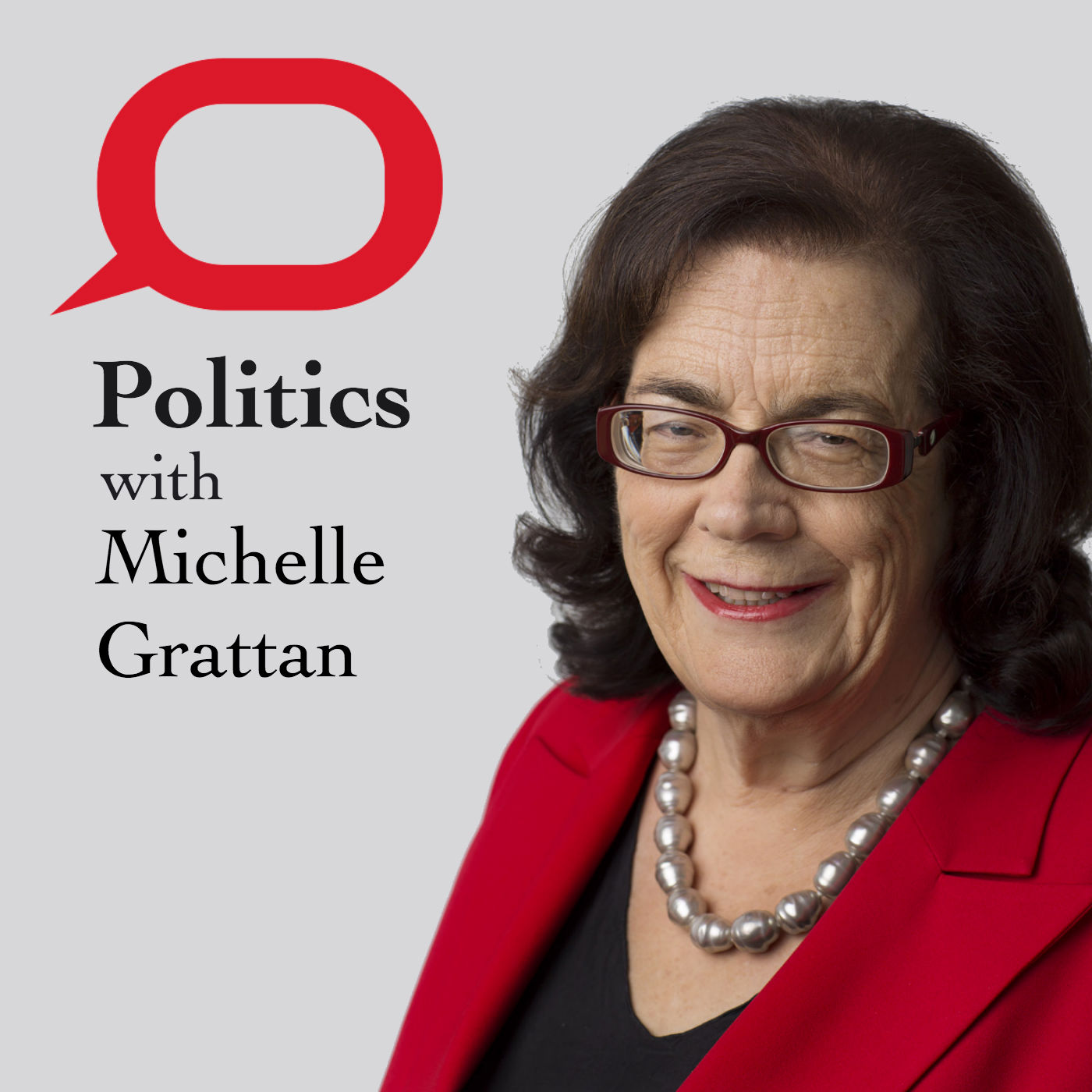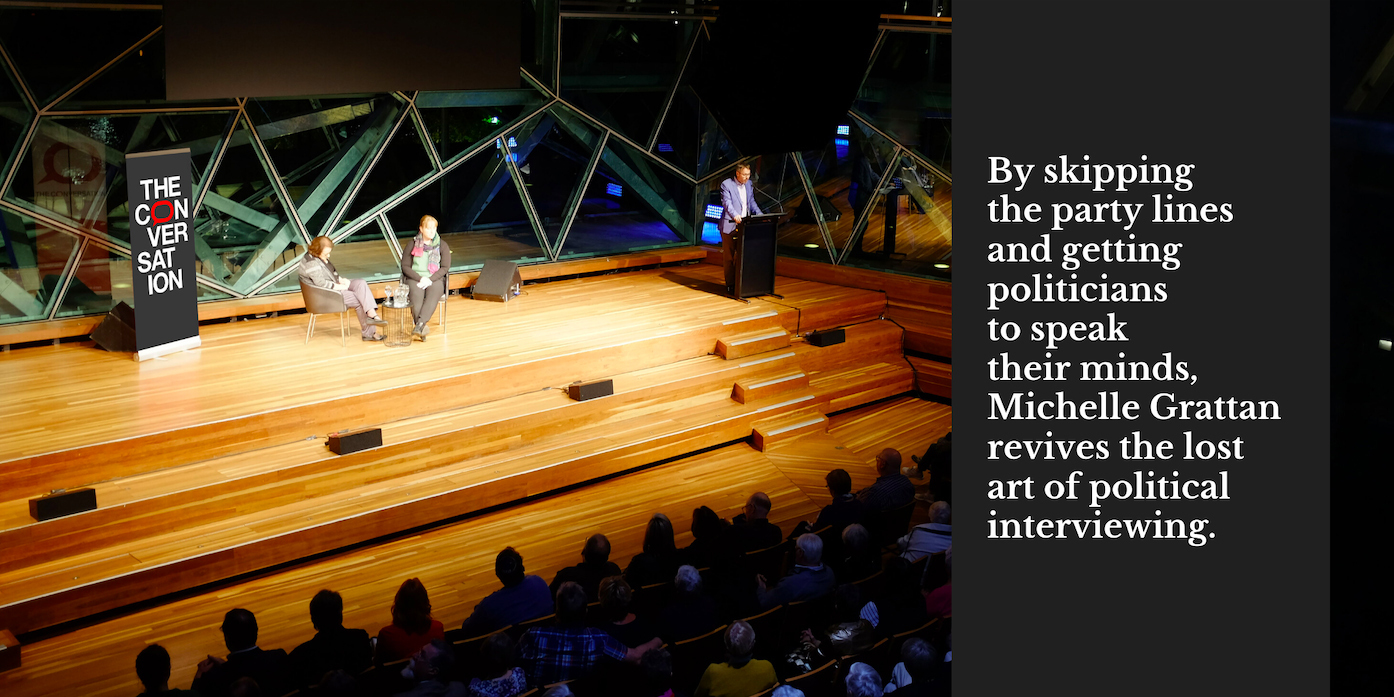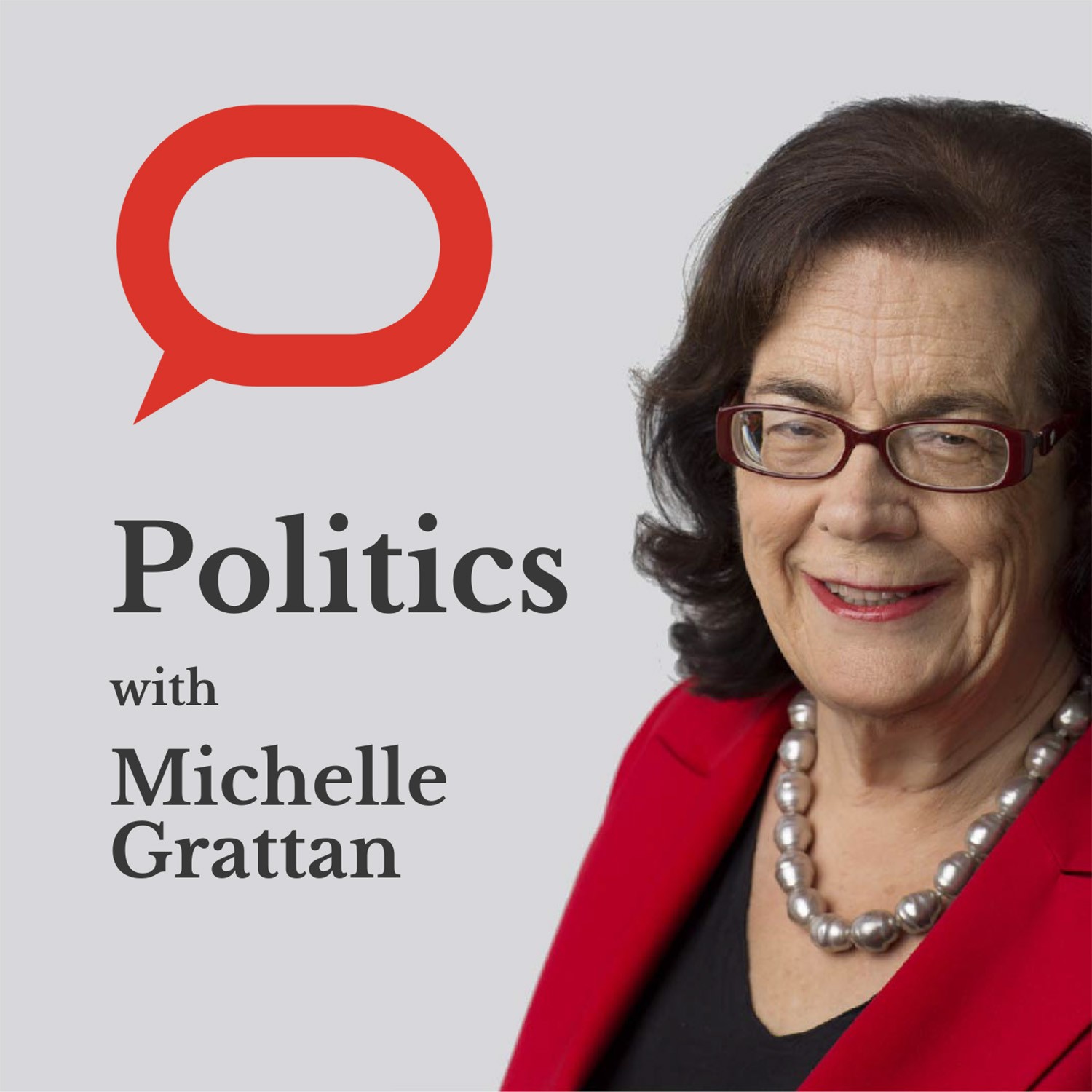Episodes

Wednesday Aug 24, 2016
Karen Middleton on ‘Albanese: Telling it Straight’
Wednesday Aug 24, 2016
Wednesday Aug 24, 2016
This week, political reporter Karen Middleton is releasing a book about the life and career of Labor frontbencher Anthony Albanese. At its heart is a deeply personal story of Albanese’s absent father.
As a boy, Albanese believed his father had died in a car accident shortly after his parent’s marriage. But at the age of 14 his mother told him the truth.
Middleton tells Michelle Grattan she came to know Albanese’s story over the years “sort of by accident”. “He had told a few people but not very many and he had kept this story about his father and his personal life very tightly,” she says.
Music credit: “Roll On” by Ketsa, Free Music Archive

Thursday Aug 18, 2016
Anne Aly on counter-terrorism policy
Thursday Aug 18, 2016
Thursday Aug 18, 2016
When parliament returns later this month, Labor’s Anne Aly will become the first Muslim woman to take a seat in the lower house. Aly is an internationally renowned scholar on counter-terrorism and de-radicalisation.
In 2014, she was the only Australian expert invited to attend Barack Obama’s summit on countering violent extremism. Aly tells Michelle Grattan she has spoken with many people who have been involved in violent organisations, including former members of the Irish Republican Army, former right-wing neo-nazis, and violent jihadists.
Aly says most deradicalisation programs fail because all that they can do is remove the opportunity, the capability and perhaps change the environment.
“But very rarely, if someone is highly radicalised, can outside forces actually change their world orientation or their world view. Many of them need to go through a process to arrive at disillusionment … in order to fully move away from the movement itself,” she says.
On the bread-and-butter issue of the GST, she welcomes Malcolm Turnbull’s idea of reforming its distribution to give her home state of Western Australia a better deal, and would like to see Labor and Liberal come together to promote WA’s cause.
“Now that Mr Turnbull has made that, I guess, commitment, to at least looking at it, I’d like to see the Western Australian cohort work across parties for the best interests of our state,” she says.

Wednesday Aug 17, 2016
Linda Burney on the 50th anniversary of the Wave Hill walk-off
Wednesday Aug 17, 2016
Wednesday Aug 17, 2016
Next week, Australians will look back at one the most significant moments in the struggle for Indigenous rights. August 23 marks the 50th anniversary of the Wave Hill walk-off when Vincent Lingiari led a group of 200 Aboriginal workers and their families off a Northern Territory pastoral station in protest against their exploitative pay and working conditions.
Labor’s spokesperson for human services, Linda Burney, who at the election became the first Indigenous woman to win a seat in the lower house, tells Michelle Grattan the events of Wave Hill were incredibly important and continue to be.
Burney says the actions of Lingiari and the Gurindji people at Wave Hill were “heroic” and should be “fundamental to everyone’s education in Australia through the school curriculum”.
Burney also traces the modern land rights movement to the walk-off.
“The Gurindji with the support of unions and many others - non-Aboriginal people - came to the south and presented their case about living conditions, about rights to country, rights to culture, and the south and the north came together and over a long period of time eventually delivered land rights to the Gurindji,” she says.
Consititutional recognition of First Australians
Acknowledging roadblocks in the way of constitutional recognition of Indigenous Australians, Burney says she doesn’t want to “entertain the notion that it can’t happen”.
“I am very disappointed that the Referendum Council has now taken the view that they can’t deliver a report until mid next year.”
“I am still very optimistic that there will be a referendum. It will not be for the 50th anniversary [of the 1967 referendum]. That symbolism is lost but I do think there is still an appetite for a referendum at some point. I am sick of this being kicked down the road. If the Referendum Council says ‘mid next year’ then lets for heaven’s sake set a definite date so we know what we’re working towards and get a set of words, a question, so we know what we’re going to be talking about,” she says.

Tuesday Aug 02, 2016
Tom Calma says Nigel Scullion should go
Tuesday Aug 02, 2016
Tuesday Aug 02, 2016
The royal commission into the Northern Territory’s youth detention and child protection systems has had a shaky start. The Four Corners program that spurred the federal government into action has also raised questions about its previous knowledge of reports of abuse at the Don Dale detention centre.
Chancellor of the University of Canberra Professor Tom Calma, who is co-chair of Reconciliation Australia and a Northern Territory Aboriginal elder, tells Michelle Grattan that there was “little to no interest” by the federal government and Indigenous Affairs Minister Nigel Scullion into the numerous reports of abuse leading up to the Four Corners program.
He says it was “pretty much swept under the carpet at the Northern Territory level” and that the Northern Territory government should not be co-sponsors of the royal commission.
“You don’t get the opportunity to have an independent royal commission very often and to have one where one of the major defendants is going to have to be the Northern Territory government … in all consciousness they should just withdraw from the process and leave it up to the independent commissioners,” he says.
Calma questions Scullion’s level of interest in his portfolio and calls for the appointment of a new minister.
“His [Scullion’s] interest in Indigenous affairs has really got to be questioned - and why he doesn’t take note of the various reports that are out there, why he limits his consultation with Aboriginal and Torres Strait Islander people to a small handful of people who aren’t representative,” he says.
“From an Aboriginal and Torres Strait Islander perspective our hand is extended to government. It’s not being embraced and that’s what’s got to change. And if that means we’ve got to change ministers to somebody who’s going to be much more responsive, who’s not going to have an attitude that consultation is about telling people what the government wants to achieve…the current minister is really not doing a good enough job.”

Friday Jul 29, 2016
Politics podcast: Tiernan Brady on the campaign for marriage equality
Friday Jul 29, 2016
Friday Jul 29, 2016
Tiernan Brady was the political director of the “yes” campaign during the Irish referendum on same-sex marriage. With the government pushing ahead with plans for a plebiscite on the issue, Brady is in Australia to help advise local marriage equality advocates.
Brady tells Michelle Grattan one of the most important aspects of the Irish referendum was that they recognised that it should always be about “a real person”.
“It shouldn’t be a set of angry debates and loud interviews where people shout at each other…what it needed to be was friendly conversations, engaging; much more about having conversations at the dinner table, on the street and in the supermarket than in Parliament or on ABC or on the radio,” he says.

Thursday Jul 21, 2016
Jim Chalmers on Labor’s approach to the economy
Thursday Jul 21, 2016
Thursday Jul 21, 2016
Labor begins its next phase in opposition with bigger numbers in the parliament and with a new level of confidence as it confronts the government.
Shadow Minister for Financial Services and Superannuation Jim Chalmers tells Michelle Grattan Labor has a pretty good record of “supporting what they can” of government savings measures. “The way I like to describe it is when it comes to the budget, you agree where you can and you disagree where you must…I’m someone who puts a lot of value in trying to find as many ways as we can to repair the budget bottom line,” he says.

Wednesday Jul 13, 2016
Darren Chester on the Nationals' success
Wednesday Jul 13, 2016
Wednesday Jul 13, 2016
By increasing their numbers within the government, the Nationals were the surprise success story of the election, with a very local campaign. Minister for Infrastructure and Transport and Victorian National Darren Chester tells Michelle Grattan the presidential style of campaigning that is becoming more prevalent in Australia doesn’t suit the Nationals.
“We don’t necessarily benefit from that style of campaigning. That’s no criticism of our Coalition partners. It’s just that they tend to focus on the metropolitan seats where the leader of the day gets a lot of media coverage. Our media coverage and our profile comes through the local newspapers in small country towns, the local ABC or the local commercial television news service,” he says.

Saturday Jul 09, 2016
Wayne Swan on Labor’s next moves
Saturday Jul 09, 2016
Saturday Jul 09, 2016
As a veteran of the Rudd-Gillard-Rudd years, former treasurer Wayne Swan is a politician with a great deal of experience with parliamentary instability. With the outcome of the election still uncertain, Swan tells Michelle Grattan Labor should approach the next period ahead in a very positive way.
“We put [forward] a comprehensive agenda for inclusive growth. What you saw at this election was the defeat of the Abbott-Turnbull agenda of trickle-down economics,” he says.
Swan says Malcolm Turnbull’s authority has been “shattered” and that he will find it very hard to assert any authority in his partyroom.
“His glass jaw-shattering speech after midnight on election night I think effectively ended his authority not just in his party but I think in the country.”
Swan says he wants to continue to speak about issues he is passionate about from the position of a backbencher rather than from the shadow cabinet.
“I want to use my time as treasurer to add to critical national debates and speak about them in a much more open way than I would otherwise if I had some form of executive responsibility,” he says.

Tuesday Jul 05, 2016
James Pearson on the knife-edge result and business confidence
Tuesday Jul 05, 2016
Tuesday Jul 05, 2016
The election has plunged Australia into uncertainty and placed a question mark over the country for companies looking to invest. Australian Chamber of Commerce and Industry CEO James Pearson tells Michelle Grattan that businesses are disappointed there isn’t a clear result and that policies that are pro-business will now be harder to get through parliament.
“The call from business now is to get on with the job of leading and running the country and making decisions for the future,” he says.

Thursday Jun 09, 2016
Nick Xenophon on his play for Senate power
Thursday Jun 09, 2016
Thursday Jun 09, 2016
Senator Nick Xenophon is the South Australian “vote magnet” making both the Coalition and Labor nervous, as he spreads his brand at this election. His probable success promises not just more Senate seats for the nascent party but a powerful role in the new Senate for its leader.
Xenophon tells Michelle Grattan he believes that while governments have a mandate to introduce legislation, the Senate has a mandate to scrutinise.
“I say that in the context that there are many hundreds of thousands of Australians that vote differently between the lower house and the upper house because under our Constitution, under our system of government, the Senate is there to represent the states.
“It’s also there under its proportional representation system to be a bulwark against excesses of executive power,” he says.

